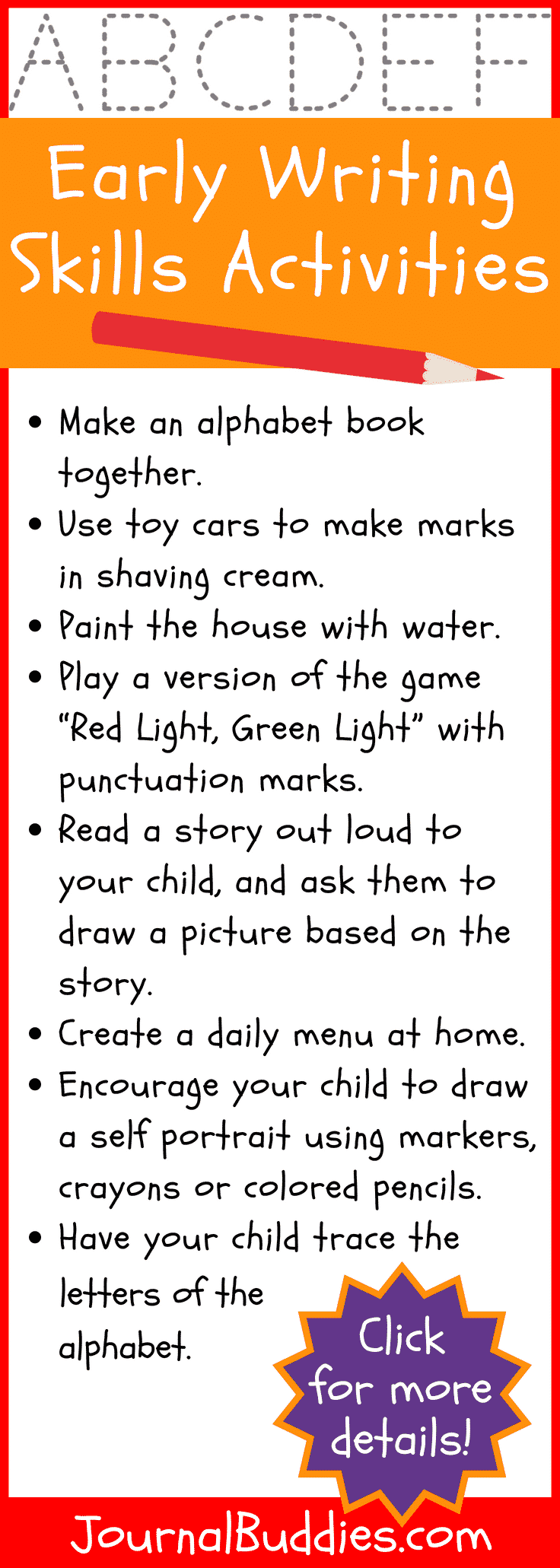Activities to Develop Early Writing Skills in Young Children— Many parents and caretakers mistakenly assume that children don’t need to begin developing their writing skills until they go to school and start learning to read and write in earnest.
While it’s true that most young children won’t begin fully reading and writing until they are in kindergarten or first grade, it’s still important to begin practicing early writing skills long before they head off to school.

Children can begin developing their early writing skills as early as 2 or 3 years old. These activities can help parents, educators, and caretakers get started.
Most likely, your child won’t even realize that you are working on their pre-writing skills with these innovative activities. They will simply be having fun while their mind and body work together to form the solid foundation that will be necessary to write clearly and effectively once they begin school.
10 Early Writing Skills Activities
- Make an alphabet book together. Write a big bubble letter on each page of the book and let your child color the letter in. After you have colored all of the letters, work together to find pictures that begin with each letter in a magazine or newspaper. The pictures can be glued onto the pages and then your child will have a complete alphabet book that they can flip through at any time.
- Use toy cars to make marks in shaving cream. Making marks such as lines, circles, and zig-zags is the first step in learning how to write letters. Your child will have fun making a mess, but you will know they are developing pivotal muscle memory that will be needed for writing in the future.
- Paint the house with water. This is a great summer activity that will keep your toddler or preschooler busy, while also helping them improve their grip and dexterity. Grab an old paintbrush and a big bucket of water and let your child paint letters, lines, or other shapes on the outside of your home.
- Play a version of the game “Red Light, Green Light” with punctuation marks. Get three sheets of construction paper — one red piece, one yellow piece, and one green piece. On the red piece, use a period for “Stop.” On the yellow piece, use a comma for “Slow down.” On the green piece of paper, use an exclamation point for “Go!”
- Read a story out loud to your child and ask them to draw a picture based on the story. This activity helps them start to identify the elements of a story and encourages them to make a connection between reading and writing.
- Create a daily menu at home. Write out what is for breakfast, lunch, and dinner. Ask your child to draw pictures to match the menu. Then read them the menu at every meal as a reminder.
- Encourage your child to draw a self-portrait using markers, crayons, or colored pencils. Simply using these tools will help them develop the fine motor skills necessary to write in the future. Keep an eye on how your child is holding their marker or crayon and help them adjust if necessary so that they can practice using a proper grip.

- Have your child trace the letters of the alphabet. Write each letter out using dotted lines and show your child how to trace them. By helping them complete this activity, you will be teaching letter recognition as well as formation.
- Work with your child to tell a story using sentence flash cards. Write out different sentences on 10-15 flashcards. Read the sentences to your child and have them sequence the flashcards into a story. Once they are done, read their silly story back to them.
- Draw shapes on a piece of paper and ask your child to draw the same shape next to it. This improves hand-eye coordination and allows children to develop their fine motor skills.
These pre-writing activities help preschool children develop the foundational skills needed in the preschool classroom – all while having fun! Other fine motor activities like threading beads with their dominant hand, working on puzzles, or tracing letters in a tray full of salt will help young children develop literacy skills. Children’s writing is an important piece of early childhood education.
Related Links and Resources
- Early Writing and Reading Activities
- How to Teach Preschoolers to Write
- Writing Skills at Different Ages
Early writing skills are pivotal, so it’s important to start focusing on muscle development and writing concepts as soon as possible. When you start writing early, your child will be much more likely to keep on writing!
If you enjoyed these Early Writing Skills Activities,
please share them on Facebook, Twitter, and/or Pinterest.
I appreciate it!
Sincerely,
Jill
journalbuddies.com
creator and curator






